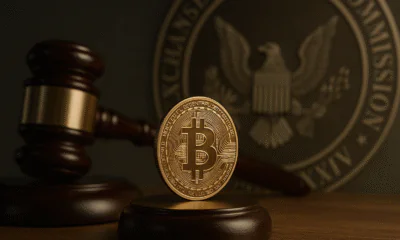Regulation
Securities Regulators Remain Busy with Warnings Issued, Enforcement Actions Taken, and Decisions Delayed

Securities regulators and enforcement officials do not have the luxury of downtime. With markets surrounding digital assets operating at all hours and on a global scale, there is a constant supply of bad actors needed to be kept in check. This past week has been no different, with various developments taking place surrounding the acceptance of crypto, and accountability of thieves.
Securities and Exchange Commission Delays VanEck ETF
While all hope is not yet lost, this week brought a small but unsurprising setback as the SEC opted to invoke its right to delay a decision on a Bitcoin ETF proposal put forth by VanEck.
Maybe 2021 will not be so different after-all. In recent months, the SEC is believed to have received 10 fresh proposals for the launch of a Bitcoin ETF. Due to mainstream acceptance of digital assets seeing a major boost in the past 6 months, many believed that SEC may be ready to change its tune and finally approve such a fund.
As it stands, the SEC has until June 17th to either make a decision, or delay the process even further. Cumulatively, the SEC is able to stretch its decision process out over a 240-day span if it sees fit. If this happens, it will not be until late 2021 that we will finally find out the fate of a Bitcoin ETF for the year.
SIM-Swapping
While not necessarily dealing with securities, various individuals are now being held accountable for their poor decisions which led to the attempted theft of over half a million dollars. The United States Department of Justice (USDOJ) has just announced that Eric Meiggs of Brockton, Massachusetts, along with various helping hands, have plead guilty to the following charges surrounding the event.
- Wire fraud
- Computer fraud and abuse
- Aggravated identity theft
- Conspiracy
SIM-Swapping is one of the more common ways in which thieves gain access to the crypto holdings of unsuspecting victims. The USDOJ states,
“SIM-swapping attacks involve convincing a victim’s cellphone carrier to reassign the victim’s phone number from the SIM card (Subscriber Identity Module Card) inside the victim’s cellphone to the SIM card in side a cellphone controlled by the cybercriminals.
Cybercriminals then pose as the victim with an online account provider and request that the provider send account password-reset links or an authentication code to the SIM-swapped device now controlled by them. The cybercriminals can then reset the victim’s account log-in credentials and use those credentials to access the victim’s account without authorization, or “hack into” the account”.
Suspicious Actions
Tokenized stocks are quickly becoming a popular way to gain exposure to publicly listed companies through digital asset exchanges. There are currently two popular exchanges competing with this particular service – Bittrex Global, and Binance.
Regulators around the world are showing that they are not necessarily as excited to just accept these new services. In particular, BaFin – a German financial regulator – has stated that the decision by Binance to support tokenized stocks is in breach of existing securities laws which require the submission of a prospectus for approval prior to listing – a requirement which was not satisfied. In its statement, BaFin referred to these moves by Binance as ‘Suspicious Actions'.
The move by Binance, which is also under scrutiny by securities regulators in Hong Kong, could result in hefty fines totaling millions if a solution can not be found with BaFin.
Sigh of Relief
While a day of reckoning has come for the aforementioned SIM-swappers, and potentially will soon for Binance, various companies have reason to celebrate today. Roughly one year ago, lawsuits were filed against 11 companies, which alleged various securities violations. This week 5 of the 11 companies named have now seen these lawsuits dismissed due to a lack of evidence put forth by the plaintiffs. These 5 include,
- Civic Technologies
- HDR Global Trading
- Kaydex
- Status Research
- Quantstamp
The result of these suits is part of a growing trend in which plaintiffs have been unable to justify their case. To date, various companies including Riot Blockchain, and Bancor have seen similar accusations surrounding securities violations fizzle out – setting a bar moving forward for those looking to levy complaints.












